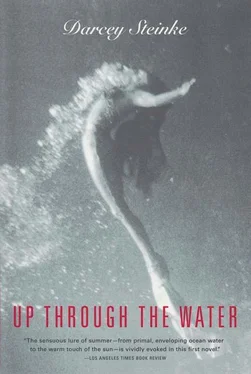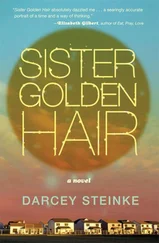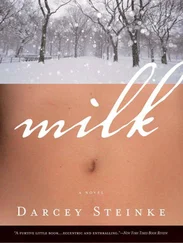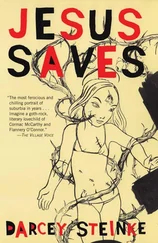T he firecracker , tossed from the cracked door of the men's room, rolled like a cigarette, then exploded.
“Get ‘em out of there,” John Berry said from outside to the boy's father who lay flat out, bare-bellied, on the hood of his car.
“Let the kid have some fun. It's the U.S. of A.’s birthday,” he said, cocking one eye as he spoke.
John Berry shook his head. “Look,” he said. He smelled barbecue and Budweiser on the man's breath. “We're not on solid ground here.”
The boy in the bathroom opened the door. John Berry saw his thin arms and hands lighting the tip of another firecracker. John Berry lunged for him, but the boy tossed the cracker, slammed the door, and laughed. The firecrackers rang and smoked near the car's front tires. “Bring me some more matches, Pop,” the boy said.
“Get out of there, kid,” John Berry said. He pounded on the door, then looked pleadingly at the boy's father, who gave him a lazy stare and calmly tipped a beer to his lips. “I'd bet today must have been hell for a guy like you.”
John Berry stared at the father. He could see, even in the dusk, the white lines on his stomach that in the sun had been shaded by fat.
“Tell your kid to get out of there,” John Berry said.
The door cracked open and he saw the boy's face. “You don't own this boat,” he said. He lobbed a whole row of firecrackers past John Berry's arm and all the way to the railing. Rat-a-tat-tat. John Berry's neck tightened. He really didn't want to hassle the kid. He was afraid to see even a shade of that expression, the one Emily'd had before he threw the bottle — pretended innocence and then fear.
“I've got some sparklers,” he said to the boy. “Would you come out for that?”
The boy didn't answer and John Berry heard his feet scuffing on the tiles as though he was shadowboxing.
John Berry turned. “Yeah,” the father said. “We're driving straight through to Jersey tonight.” He gestured in the air with an open hand.
John Berry shook his head and walked down the metal steps. Opening his locker, he grabbed the sparklers out of the bag that contained his beer and cigarettes. The long red and white box reminded him of last year when he'd gotten off for the Fourth and Emily and he had gone to a cookout. He remembered her bare shoulders in a sundress and how, as it darkened, her skin blurred as if she were underwater. Most of the night she sat on a low-slung wooden porch chair with a floral cushion, talking to Tom's wife, and he'd sat across and watched her. Even then he was beginning to suspect that there could be others.
As he climbed the stairs back to the deck, he lit the end of two sparklers: long, metallic cattails that buzzed and threw sparks every which way. He stuck one into the crack between the boat wall and door so the boy would see tiny stars shooting into the men's room.
“This man brought you something,” the father said, his eyes still closed.
The door opened slowly. John Berry watched the kid, shirtless in cutoffs and tennis shoes, walk over and take the wire handle from him.
He wrote out words in orange cursive: Bird, Sand, a swirling Water. He announced each one.
Both flames went out then with a tired crackle and whiff. The boy eyed the box of sparklers in John Berry's pocket.
John Berry took three more out, lit them with his lighter, and passed one to the boy and another to his father, who put the handle into his mouth and shut his eyes. It made his face reddish and sparks tattered over the edge of his brow onto his bald head.
The boy wrote out his name, Billy, then his father's, Paul, then girls: Ann, Sue, Cathy. .
John Berry tipped his and wrote Emily in the dark, etched it slowly, and saw it float there.
“Turn that shit off,” Birdflower said, his hands moving over the grill like a magician.
Lila walked over to the cassette player which was balanced above the microwave and ejected a tape. “You wouldn't think you'd be so grumpy, now that you got yourself a girl.”
Birdflower turned toward her and she thought she saw a smile edging up around his mouth.
The owner yelled out: “Three Fourth of July fish fries.” She hustled to the grease bin, dropped the frozen fish patties into the metal basket, plopped them down with a sputter. Birdflower was wiping his face with a bandanna and sticking little toothpick American flags in a line of burgers.
“I don't know what your problem is lately,” he said, shaking his head.
“I did it,” she said casually. She waited for him to move. His wet T-shirt clung to his back. After a moment he turned his head and looked at her over his shoulder. “Did what?”
Lila walked over to him, leaned her stomach on the black knobs, and bent around, over the grill, so she could see his face. “You know,” she said.
Birdflower flipped a hamburger, rolled the hot dogs, and pressed the cooked onions into a tighter pile.
Lila got closer to his face. “I said—”
“I get it,” Birdflower said. “What do you want me to say?”
A kid screamed out on the porch and Lila moved away from him. “I don't know,” she said, reaching for the prongs to get the fish. “I just thought you should know.”
Emily wet a dish towel and put it on her neck and wrists. “There are millions out there. The seating list is two pages long. I never should have agreed to wait tables.”
“You'll make good money for just wiggling your tail,” Neal said.
She threw the towel across the counter at him.
“Very funny,” he said, rocketing it back. “Your platters will be up in a minute.”
Neal turned to check the scallops whitening in a skillet on the stove. The kitchen was damp with steam, and other waitresses hurried in and out without speaking to anyone.
She watched Eddie separating silverware into plastic canisters; knives, forks, soup spoons, the occasional long iced tea spoons all lay scattered under his hands. He'd worn jeans to work, and Emily knew that meant he was meeting Lila later.
The bell dinged and she walked over, set the broiled platters on the tray, twisted a lemon slice on each fish fillet, and grabbed a cocktail sauce cup for the shrimp. Over her shoulders she watched Eddie lobbing rinse tablets into the huge sinks. The water turned Caribbean blue in seconds.
Emily delivered the seafood and refilled water glasses. She saw about twenty old women in bright-colored pantsuits file into the dining room.
Some sat right down at the tables the busboy was pushing together for them. A few clustered around the entrance, rubbing their loose upper arms and pulling their jackets around them. Most of the women had gray hair tinted blue or purple and the styles were similar: short, with a loose curl on each side, and one lying like a little mouse on top.
She walked over and introduced herself to a few of the women at one end of the table and told them she'd be their waitress.
“We're the Georgia Songbirds,” a big-breasted woman said. “We gave a concert down in Morehead.” She was tanned on her forearms, as if from going onto the beach fully clothed.
Emily went around the table.
“My stomach,” the last lady said, fingers clenching the menu, “is thinking of jumping clear out of my mouth and searching down food on its own.” Emily wrote the order onto her pad. “Your tan is lovely,” the woman said, and laid a pale hand on Emily's arm.
The big woman motioned to the others. All stood in a slow way, as for the Gospel in church, and began singing. Emily looked around at the other customers, and most smiled and nodded toward the women. “God bless America,” they sang out. “Land that I love. Stand beside her, and guide her. .”
The other waitresses paused around the coffee maker. They put their hands on their hips and shook their heads. For the first time that night, a few of them smiled. Eddie came out and stood beside the waitresses. Neal leaned in the doorway and placed a hand over his heart. The hungry woman at the end of the table began the next song with a voice like a young child's: “Yankee Doodle went to London riding on a pony. .” The rest lifted their arms to, gether and, with gusto, came in on the chorus, “I am that Yankee Doodle boy!”
Читать дальше












